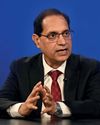
THE REVIVAL OF the public-private partnership (PPP) model and mobilisation of private capital for infrastructure investments is one of the biggest imperatives for the government. Recent reports have highlighted that new orders from the National Highways Authority of India have dropped because the finance ministry has prevented it from raising further loans. There is a fear that this could seep into other sectors. With the rapid decline of private sector investments in infrastructure from 2012 onwards, the bulk of the country’s growth has been through public expenditure. But there will be a limit to this.
Of the ₹20 lakh crore of investment envisaged under the National Infrastructure Pipeline (NIP), ₹10 lakh crore per annum is allocated from the Union Budget, while the balance ₹10 lakh crore comes from the states, private sector and extra-budgetary resources. But as this amount increases over the years, reviving private investments into India’s infrastructure sector will become critical.
The most macro way to look at the infrastructure financing requirement for India is to consider the metric called gross capital formation in infrastructure (GCFI) as a percentage of GDP. India’s GDP at current prices is estimated at ₹330 lakh crore in FY24, while GCFI would be at about 8% of the GDP at current prices, or ₹26 lakh crore. In the coming years, this is likely to grow in sync with the 12% nominal GDP growth. This is, however, not a huge amount of money. In the Budget 2024-25, I would expect the government allocation to infrastructure development to rise to ₹13-14 lakh crore, which would be matched from the other three constituents.
Denne historien er fra February 18, 2024-utgaven av Business Today India.
Start din 7-dagers gratis prøveperiode på Magzter GOLD for å få tilgang til tusenvis av utvalgte premiumhistorier og 9000+ magasiner og aviser.
Allerede abonnent ? Logg på
Denne historien er fra February 18, 2024-utgaven av Business Today India.
Start din 7-dagers gratis prøveperiode på Magzter GOLD for å få tilgang til tusenvis av utvalgte premiumhistorier og 9000+ magasiner og aviser.
Allerede abonnent? Logg på

"IF ANYONE WANTS TO INVEST, COME TO HYDERABAD"
Telangana CM Revanth Reddy's global ambitions, AI, green energy, and how Hyderabad is positioning itself as a premier business and innovation hub

Where Food Meets Magic
THE FOOD AT THE ROCA BROTHERS' RESTAURANT IN GIRONA TRANSCENDS THE ORDINARY TO BECOME PURE MAGIC

"INDIA SHOULD CONSIDER LAND POOLING MODEL"
Andhra Pradesh (AP) minister Nara Lokesh talks about what governments can learn from the state about overcoming the land availability challenge

Breaking Barriers: The Extraordinary Journey of Pulkit Prakash
In an era where success often seems predetermined by privilege, Pulkit Prakash's journey from modest beginnings to legal eminence challenges conventional narratives. His remarkable transformation into the founding partner of Niti Bodh, a prestigious law firm, demonstrates how unwavering determination can reshape destinies.

"Keep the company's imperatives in mind first"
Westlife Foodworld Limited is a fast food restaurant holding company

Beyond the Scalpel: How Dr. Unmesh Takalkar Revolutionized Healthcare in Central Maharashtra
In an era where medical excellence often leads to overseas opportunities, one doctor chose a different path - transforming his homeland's healthcare landscape instead of seeking personal fortune abroad. Dr. Unmesh Vidyadhar Takalkar's journey from a bright medical student to a pioneering healthcare visionary in Marathwada stands as a testament to the power of purpose-driven leadership.

"Fils WILL MAKE A COMEBACK, MAYBE THIS YEAR"
Veteran investor Madhusudan Kela, Founder of MK Ventures, on Union Budget 2025-26, the future trajectory of the market, the Indian economy and more

"TAX CUT TO PUT MONEY INTO PEOPLES' HANDS"
Tuhin Kanta Pandey, Finance and Revenue Secretary, and Arunish Chawla, Secretary of DIPAM, explain the macro philosophy of the Budget

A BONANZA FOR THE MIDDLE CLASS
THE GOVERNMENT INCREASED THE TAX EXEMPTION LIMIT TO 12 LAKH AND REVISED RATES LOWER UNDER THE NEW TAX REGIME IN THE BUDGET FOR FY26. WITH A NEW INCOME TAX BILL ON THE WAY, WHAT DO THE MEASURES MEAN FOR TAXPAYERS?

Expect Private Investment Cycle To Pick Up
The government's budgetary strategy focusses on modification and moderation, a fine balance between the long term and the short term